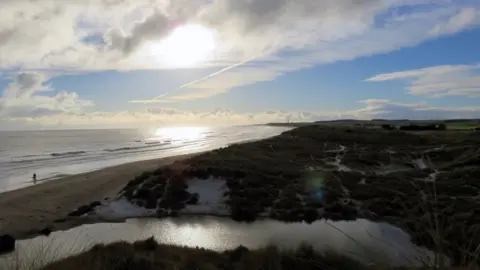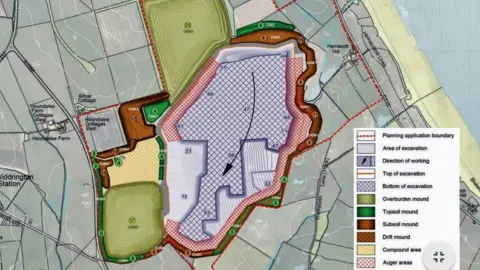Sajid Javid rejects Druridge Bay opencast mine plan
 BBC
BBCControversial plans for an opencast mine near a beach have been rejected.
Plans to extract three million tonnes of coal, sandstone and fireclay from a site near Druridge Bay were approved by Northumberland County Council in 2016.
However, opponents said the mine at Highthorn would ruin wildlife and tourism and the proposals were called in by communities secretary Sajid Javid, who has now thrown them out.
Developer Banks Mining said it was an "absolutely perverse" decision.
Managing director Gavin Styles said it "flies in the face" of the approval given by the government's planning inspector and the county council.
"Mr Javid has chosen to flagrantly disregard this expert opinion from the comfort of his London office without ever having taken the time to even visit the area in question," he said.
The Save Druridge campaign said it was delighted Mr Javid had "understood the immense impact coal has had on climate change and also on communities which have had to live with opencast mines".
"Many of these have been in tranquil and scenic areas and have devastated our local wildlife, landscape and caused increased traffic, noise and dust pollution for many years," spokeswoman Lynne Gargett said.
 Banks Group
Banks GroupFriends of the Earth, which had also opposed the plans, said the action was a "huge victory" for local residents.
Campaigner Rose Dickinson said it meant "an important step forward has been taken in ending the era of fossil fuels".
"This is the first coal mine ever to be rejected in the UK because of climate change impacts - a vindication for everyone who has been calling for fossil fuels to be left in the ground," she said.
In refusing the plans, Mr Javid had "considered all the evidence heard at the public inquiry, together with the recommendation of the planning inspector", his department's spokesman said.
"His decision took account of all material considerations, including the potential environmental impacts of the scheme."
The Highthorn scheme would have created at least 100 jobs and invested £87m into the Northumberland economy, Mr Styles said.
Three million tonnes of coal would otherwise have to come from "potentially unstable" overseas markets, he said.
